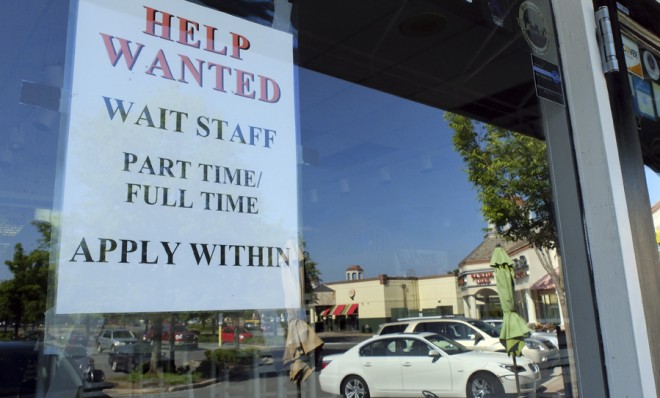Are low-wage jobs messing with the economy?
The disparity between GDP growth and job growth is striking

A free daily email with the biggest news stories of the day – and the best features from TheWeek.com
You are now subscribed
Your newsletter sign-up was successful
Jobs data and GDP data, both released Wednesday, paint very different pictures of the U.S.'s economic recovery.
U.S. businesses added 200,000 jobs to the economy in July, the payroll processor ADP reported. The government's official jobs report won't be out for two more days, but the numbers are in step with recent trends: The economy created 195,000 new jobs in June, and 175,000 in May — good-but-not-great numbers that imply the economic recovery is proceeding at a slow, but steady pace.
Meanwhile, the U.S. Bureau of Economic Analysis (BEA) released its first estimate for the second quarter GDP growth. Based on GDP data, a measure of all the goods and services produced within a nation's borders, the recovery looks like it's struggling.
The Week
Escape your echo chamber. Get the facts behind the news, plus analysis from multiple perspectives.

Sign up for The Week's Free Newsletters
From our morning news briefing to a weekly Good News Newsletter, get the best of The Week delivered directly to your inbox.
From our morning news briefing to a weekly Good News Newsletter, get the best of The Week delivered directly to your inbox.
The BEA estimate put the annual growth pace in the second quarter at 1.7 percent. It also revised the first quarter GDP down to 1.1 percent, from its earlier estimate of 1.8 percent, indicating that the sequester — sweeping cuts to federal spending passed earlier this year — took a bigger bite out of growth than previously believed.
In all, the data showed the economy grew just 1.4 percent since the middle of last year — the slowest year-over-year pace since the recovery began three years ago.
Economist Justin Wolfers had this to say about the contrast:
So why the incongruity? "Some analysts say job growth is outpacing the sluggish economy because employers are making up for slow hiring early in the recovery," says USA Today.
A free daily email with the biggest news stories of the day – and the best features from TheWeek.com
However, investment banker Daniel Alpert had another idea, homing in on the fact that job growth has mainly occurred in low-wage sectors. Indeed, 75,000 of July's 200,000 jobs were in the leisure and hospitality industries, which typically pay low wages. Alpert wrote in Business Insider:
[T]he fact is that the U.S. employment situation is more of a wounded beast than a bull. And it is a wounded beast whose entrails tell a different story, indeed — one that ties far more convincingly into the anemic sub-2 percent GDP growth rate of the U.S. economy and the sluggish retail sales data we have seen of late. [Business Insider]
Furthermore, low-wage jobs may contribute to the cycle of sluggish growth. "[J]obs in the low-wage-paying sector offer the smallest bump up in economic activity not only because of their nominal wage levels," argued Alpert. "They also provide a correspondingly smaller net benefit to the economy in terms of the spread between the unemployment benefits being received by a formerly out of work individual and the compensation being received for working."
Carmel Lobello is the business editor at TheWeek.com. Previously, she was an editor at DeathandTaxesMag.com.
-
 6 of the world’s most accessible destinations
6 of the world’s most accessible destinationsThe Week Recommends Experience all of Berlin, Singapore and Sydney
-
 How the FCC’s ‘equal time’ rule works
How the FCC’s ‘equal time’ rule worksIn the Spotlight The law is at the heart of the Colbert-CBS conflict
-
 What is the endgame in the DHS shutdown?
What is the endgame in the DHS shutdown?Today’s Big Question Democrats want to rein in ICE’s immigration crackdown